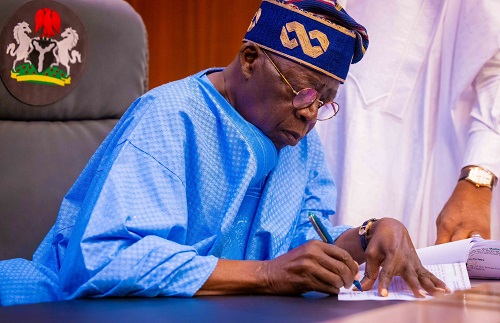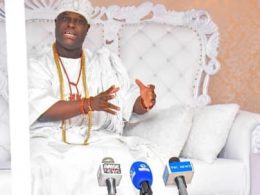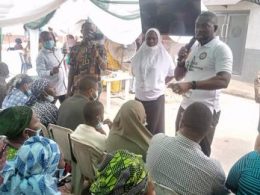“Today, I am pleased to inaugurate 43 new Ministers who will work with me and the Vice President in our service to the people of Nigeria.
“You were chosen from each of the 36 States of the Federation, and most importantly, you share my commitment to working tirelessly for the people of this country and to achieving a future where every Nigerian can reach his/her full potential.”
These were the words of President Muhammadu Buhari on August 21, when he inaugurated the 43 ministers into the Federal Executive Council (FEC) for his second term administration.
The President also charged the ministers to deliver on the core objectives of the administration which are, “to improve security, achieve diversified, inclusive economic growth and fight corruption.
Precisely 100 days after the inauguration, how has the Ministry of Information and Culture being supervised by Alhaji Lai Mohammed, deliver on the mandate of service delivery to the people?
The terrain might be familiar to Mohammed who in Buhari’s first tenure supervised same ministry charged with the responsibilities to communicate government policies and programmes, build a positive image for the country and promote national consciousness.
It would also be recalled that Mohammed held sway as spokesperson of the All Progressives Congress (APC) in its opposition days and his contributions were believed to have, to a large extent earned the party victory in the 2015 general elections.
However, observers have viewed the past 100 days of Mohammed’s reappointment as minister as most challenging because of perceived controversial policy decisions of government which did not go down well with some section of the populace.
Immediately after his swearing-in, the first task by the minister was an inaugural meeting with the management and members of staff of the ministry whom he charged to redouble their efforts to justify the confidence reposed in him by the president.
Mohammed told the gathering that his reappointment and posting back to the ministry was as a result of the confidence Buhari has in him to manage the image and reputation of government as well as promote the culture of the people.
His subsequent meetings with the heads of parastatal agencies under the ministry were very instructive and avenues to hint on his agenda and programmes as well as solicit their support.
Specifically, Mohammed charged the heads of information agencies under the ministry to use their platforms to dial down the tension of disunity, defeat those fanning the embers of discord and promote correct perspective about the country.
At a meeting with members of the Broadcasting Organisation of Nigeria (BON), the minister hinted on the President’s approval of a wide range of reforms to bring sanity into the broadcasting industry.
When he received the Chief Executive Officers of Culture and Tourism Agencies under the ministry, he reiterated that his reappointment was in recognition of the modest successes achieved in the first term, adding “reward for hard work is more work”.
He challenged them to use culture as a tool for peace and development and, specifically asked them to explore cultural diplomacy to curb incidences like the ravaging xenophobic attacks against Nigerians in South Africa at the time.
The first major task for Mohammed was the challenge of managing information to prevent escalation of reprisal to the rising xenophobic attacks against Nigerians in South Africa.
It would be recalled that in the wake of the renewed xenophobic attacks in South Africa, there were reports that some Nigerians, angered by the development, started attacking South African companies in Nigeria.
At a world press conference to address the issue, Mohammed appealed against attacking South African businesses operating in the country because according to him, doing so would hurt Nigerians more.
He explained that the investors and workers in such South African companies in Nigeria, especially MTN and Shoprite, were Nigerians and attacking them would mean ‘a classic case of cutting off your nose to spite your face”.
He also used the press conference to alert Nigerians to the doctored and fake video clips being circulated on the social media, purportedly showing how Nigerians were being killed in South Africa.
He said the video clips were meant to inflame passion and complicate the efforts of the government to calm frayed nerves at home in the wake of the xenophobic attacks.
Similarly, the intervention by the minister helped to change the negative narratives around the 9.6 billion dollars judgment debt by a UK court against Nigeria over a botched gas contract with an Irish company, Process and Industrial Developments Ltd. (P&ID).
When the news of the judgment debt broke, many Nigerians erroneously concluded that it was self-inflicted due to negligence, lack of continuity in governance and non-diligent prosecution of the case, among others.
Some also bought to the narratives by the company that Nigeria assets were under imminent threat and more than 20 percent of the nation’s foreign reserves would be annexed to pay the judgment debt.
Apart from addressing a world press conference with some ministers, Mohammed appeared on many television and radio programmes to correct the negative narratives and set the records straight
He told Nigerians that the purported contract from inception was a calculated move by international and local scammers to defraud and deplete the country’s rising foreign reserves.
The minister said that the contract was conceived and designed to fail and there were deliberate efforts to circumvent all the checks and balances to prevent breach.
Consequently, most Nigerians realised the need to support the government to repudiate the judgment debt and protect their common patrimony from foreign hawks with local collaborators.
Mohammed was also in the team of Nigerian delegation to London when the UK commercial court gave Nigeria a reprieve by granting a stay of execution of the judgment debt and request for leave to appeal.
While in London, he led the delegation to media outlets such as Bloomberg, Financial Times, the Economists and others to change the narratives of the case in favour of Nigeria and win minds of the international community.
Mohammed stirred up a hornet’s nest with the announcement of the review of the National Broadcasting Code to reflect stiffer penalties for violators of broadcasting regulations and government’s plan to sanitise the social media space.
While inaugurating a National Broadcasting Commission (NBC) Reform Implementation Committee on October 10, he said President Buhari approved the review of the Code and extant broadcasting laws to reflect stiffer penalties for violators of broadcasting regulations.
The approval, according to him, was sequel to the unprofessional and unethical conduct of some broadcast stations, especially before and during the last general elections.
The minister announced upward review of fines from N500,000 to N5 million for breaches relating to hate speeches, inciting comments and indecency while willful repeat of infractions on three occasions after levying fine on a station would attract suspension of license.
Breach of political comments relating to hate speeches and divisive comments was upgraded to “Class A” offence in the Broadcasting Code,
He said NBC Act will also be amended to enable the commission break monopoly in the industry, license WebTv and radio stations, including foreign broadcasters beaming signals into Nigeria.
The reviewed code will also ensure the Independence of the NBC from political interference, deployment of modern monitoring equipment and welfare packages for workers to avoid their compromise in the line of duty.
Similarly, the announcement by the minister on the government’s decision to regulate and inject sanity into the Social Media space did not go down well with many stakeholders.
At a media briefing on October 29, Mohammed reiterated that the social media had gone totally out of control and if left unchecked, would trigger national conflagration.
He noted that social media had become the potent platform for the purveyors of twin evil of fake news and hate speech.
“No responsible government will sit by and allow fake news and hate speech to dominate its media space, because of the capacity of this menace to exploit our national fault lines to set us against each other and trigger a national conflagration.
“That is why we will continue to evolve ways to tackle fake news and hate speech until we banish both.’’
Mohammed emphasised that the government, in sanitising the social media, will not muzzle the media and stifle free speech.
“This administration has no intention of muzzling the media or stifling free speech, our campaign is against fake news and hate speech.
“However, if you engage in disseminating fake news or hate speech, you need to be worried, because we will not spare you,” he said.
In spite of the assurances by the minister, some stakeholders including the Guild of Editors, National Union of Journalists (NUJ) opposed the plan by government to sanitise the air waves and the social media.
The critics underscored the importance of free, independent, vibrant and nationalistic press to good governance in a democracy.
While they regretted the escalation and danger of fake news and hate speech, they however, expressed the fear that the government actions would be used to silence the media and perceived opponents.
The minister welcomed the debate that followed government position and announcements but insisted no amount of attacks, sponsored or otherwise, would stop the regulation of the air wave and the social media.
In line with the directive of the President to the ministers to deliver on the cardinal objectives of the administration, Mohammed had in the 100 days organised two special town hall meetings on security and fight against corruption respectively.
A special Town Hall meeting on banditry, cattle rustling and kidnapping in the North West zone was held on Oct. 15 in Katsina.
The event was attended by the Governors of Katsina, Aminu Masari, Sokoto, Aminu Tambuwal, Zamfara Bello Matawalle as well as Ministers of Interior Rauf Aregbesola and Defence, Bashir Magashi among others.
It provided the platform for the governors of the front-line states to highlight the successes they have achieved in their various states and for people to offer their views and suggestions on the way forward.
Specifically, the three governors acknowledged that security situation in their respective states had improved owing to the support from the Federal Government, innovative approaches they respectively introduced and cooperation of stakeholders.
The governors recommended more funding for security agencies, more collaborations among states, deployment of modern technology, recruitment of more military personnel and policemen, value reorientation and job opportunities for youths to end the scourge.
Similarly, a special Town Hall meeting on the fight against corruption was hosted by the minister in Abuja on Nov. 7.
The meeting afforded the anti-corruption agencies in the country to give their scorecards and get feedback and suggestions from the citizens on how the war can be won.
It was generally agreed that the fight against corruption was pivotal to the success of the other cardinal programmes of the administration.
Following the outcry that trailed the Presidential directive on partial closure of its land and maritime borders with neighbouring countries, Mohammed during an official visit to “The Sun” newspaper in Lagos underscored the need for Nigerians to endure the temporary effects of the action.
“We know that the closure is inflicting some collateral damages to many people but in the overall interest of Nigerians, we need to persevere and bear with the government so that our neighbours would be responsible and responsive.
“There is no gain without pain, Nigerians must endure the temporary effects of the borders closure to reap the attendants benefits.
“You cannot turn Nigeria to a dumping ground of harmful goods just because we are neighbours and share common borders,’’ he said.
.
Consequently, Mohammed championed a visit with other ministers and the media to Seme, a border town between Nigeria and Benin Republic to inspect and assess the potency of the border closure.
Briefing the media at the border post, the minister recounted higher import revenue, lower, domestic fuel consumption and increased rice production by local farmers among the gains of the closure of the country’s land borders in four geo-political zones of the country.
It is believed in certain circles, that the minister paid more attention to the information sector than he did to Culture and Tourism sector of the ministry.
Mohammed, however, corrected the misconception when he met with the Travel Journalists, Arts and Culture Writers Association of Nigeria in October in Lagos.
“This may appear so because the issues we usually deal with in the Information sector are those that receive the bigger play in the media.
“But I can tell you, with evidence, that we achieved a lot in the Tourism and Culture Sector or in the Creative Industry generally,” he said.
The minister at that meeting, unveiled his agenda to transform the creative, tourism and culture industry into Nigeria’s new oil in the next four years.
Highlighting the programmes to build on the gains of the past four years, the minister said he would set the necessary legal framework, conclude launch of the National Policy on Culture and National Policy on Tourism.
Specifically, he said the ministry would finalise work on the Motion Picture Council of Nigeria (MOPICON) Bill and submit it to the Federal Executive Council (FEC).
“The plan is to create a proper regulatory environment for the sub-sector that has put Nigeria’s name on the global map, thus attracting the much-needed investment to the sector,” he said.
Mohammed said he would establish the Endowment Fund for The Arts to create a legal framework for the financing of the sector and kick-start the implementation of the parts of the Tourism Master plan that constitute low-hanging fruits.
In line with the agenda, the minister led Nigeria delegation to the 23rd General Assembly of the United Nations World Tourism Organisation (UNWTO) held in St Petersburg, Russian Federation in September.
Mohammed who was the Vice President (Africa) of the UNWTO reiterated that the ministry would complete work on the establishment of Tourism Statistics and Tourism Satellite Account (TSA), working with the organisation.
The minister also attended the 2019 Africa International Film Festival in Lagos where he pledged government continued support to the film industry which had put the country on the global map.
At the maiden Nigerian Agip Oil Company (NAOC) JV Host Community Day, held in Port Harcourt, Mohammed admonished International Oil Companies (IOCs) to use culture to foster peace in their host communities.
No doubt, the 100 days of reappointment of Mohammed as Minister of Information and Culture had been challenging and a beehive of activities, but observers believe that the ministry can do more in the delivery of its mandate with adequate funding.
Little wonder, the House of Representatives, during the 2020 Budget Defence of the ministry, appealed to Buhari to fund the Culture and Tourism sector and harness its potential to unite the country.
The lawmaker expressed displeasure over the meager allocation released to the ministry in the 2019 budget.
“If the ministry can get less than N300 million released to it in a year, it shows that we are not yet serious to priotise the culture and tourism sector.
“The Culture and Tourism sector is as important as the agriculture sector. I am making personal appeal to the President to take the sector very serious.
“Culture drives unity, this is a major sector that will drive the unity of the country, create massive employment and generate fund for the government.
“On our part, we are going to take necessary actions to ensure that this important sector is not taken for granted,” Hon. Omoregie Ogbede-Ihama, Chairman, House Committee on Culture and Tourism said.
The Senate also noted that the ministry is underfunded and called on the President to make the culture and tourism sector a priority in his economy diversification and employment generation programmes.
The lawmakers said they were particularly worried about the paltry allocation for the information sector of the ministry considering the enormous task.
They underscored the need for the ministry to be well funded to deliver its mandate of projecting government activities, policies and programmes as well as the image of the country locally and internationally. (NAN)









